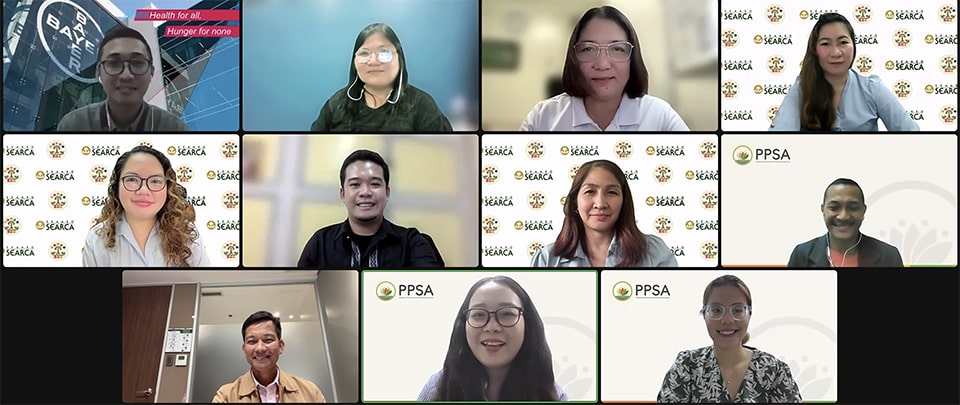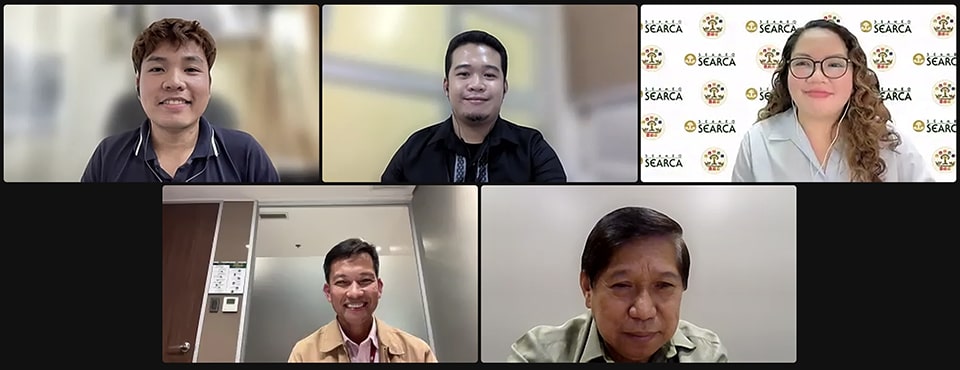 The organizing team from SEARCA and PPSA, along with the resource speakers.
The organizing team from SEARCA and PPSA, along with the resource speakers.
Committed to fostering stakeholder collaboration and promoting advancements in the agriculture sector, the Southeast Asian Regional Center for Graduate Study and Research in Agriculture (SEARCA) partnered with the Philippine Partnership for Sustainable Agriculture (PPSA) for the e-Kapehan Session on Research and Innovations in the Coconut and Corn Industries via Zoom on 29 August 2024. The event brought together researchers, innovators, and industry players to share knowledge, discuss current research findings, and explore innovative solutions to the challenges faced by two of the Philippines' most important crops—coconut and corn.
In her opening message, Dr. Gerlie Tatlonghari, Program Head of SEARCA's Research and Thought Leadership Department, underlined the value of the coconut and corn industries as pillars of the Philippine agricultural economy. She highlighted that research and innovation are crucial in ensuring that these sectors thrive in the face of adversity, given the challenges facing these crops, from the impacts of climate change to pest and disease outbreaks.
 The resource speakers for the panel discussion on coconut and the session moderator, Ms. Danellie Joy Medina (top, rightmost), SEARCA-RTLD Program Associate.
The resource speakers for the panel discussion on coconut and the session moderator, Ms. Danellie Joy Medina (top, rightmost), SEARCA-RTLD Program Associate.
Top, from left: Mr. Jessiemar Cabasag and Mr. Joel Larupay from PCA-ZRC
Bottom, from left: Mr. Glenn Apostol from Natura Aeropack Corporation and Mr. Ramon Taniola from D&L Industries, Inc.
The first panel session focused on the coconut industry. Mr. Jessiemar Cabasag and Mr. Joel Larupay, Senior Research Specialists from the Philippine Coconut Authority-Zamboanga Research Center (PCA-ZRC), discussed PCA's initiative to conserve the Philippine coconut genetic resources by collecting germplasm to support hybridization efforts. With 263 coconut accessions, the PCA-ZRC Field Bank is one of the world's largest depositories of coconut collection, particularly for indigenous populations/varieties. Since the genetic resources are used for high-value and emerging products, they can also determine and recommend coconut varieties tailored to the specific needs of farmers.
Also part of the first session were Mr. Ramon Taniola, Senior Consultant of the D&L Industries, Inc., and Mr. Glenn C. Apostol, Research and Development Director of the Natura Aeropack Corporation, who spoke about green chemistry using coconut-derived products. Mr. Apostol explained that green chemistry is a modern discipline focused on designing products and processes that maximize resource efficiency and minimize waste generation. The company's green initiative is integrated across its diverse product range, including coconut oil refining, oleochemicals manufacturing, concept formulation, and private-label production. Adopting green chemistry approaches in the value chain also requires a careful balance. "While it should be driven by market demands, it must also align with global requirements, such as reporting the carbon footprint of products," he explained. Mr. Taniola also shared the community-based projects of Lao Foundation, Inc., a nonprofit organization that is part of the D&L Group of Companies.
 The resource speakers for the panel discussion on corn and the session moderator, Ms. Drisana Mairi De Jesus (top, left), PPSA Communication Officer.
The resource speakers for the panel discussion on corn and the session moderator, Ms. Drisana Mairi De Jesus (top, left), PPSA Communication Officer.
Top, right: Mr. Cyrus Isles from Bayer CropScience Philippines
Bottom, from left: Dr. Elaida Fiegalan from CLSU and Dr. Clarissa Juanico from UPLB.
During the second session, Mr. Cyrus Isles, Head of Public Affairs at Bayer CropScience Philippines, discussed Bayer's regenerative agriculture corn technologies, such as short-stature corn and hybrid wheat, both driven by gene editing and precision breeding techniques. Bayer also capitalizes on data and leverages various AI tools, machine learning, and genomic insights to assist in selecting specific traits at the farm level, guiding future decisions for developing new corn varieties.
Dr. Elaida Fiegalan, Head of the Plant Pests & Diseases Clinic Surveillance Research Center at the Central Luzon State University (CLSU), talked about the PEST D-TECH Project, which aims to identify and manage pests and diseases in onion and corn in selected sites using robotics and drone technology. A key aspect of the project's sustainability plan is ensuring the technology reaches the farmers. "We, along with partners from the private sector, have to train local government units (LGU) to become GIS experts, drone pilots, and good disease monitors or pest infestation investigators. We hope that once the LGUs adopt the technology, it will also enable farmers in their areas to receive critical pest and disease information," Dr. Fiegalan explained.
Dr. Clarissa Juanico, Associate Professor at the Institute of Human Nutrition and Food College of Human Ecology-University of the Philippines Los Baños, presented their project on using Nixtamalized Corn for food and nutrition. Nixtamalization involves cooking dried kernels and steeping them in an alkaline solution, usually water and food-grade lime. It is then drained and rinsed to remove the outer kernel cover and milled to produce a dough that forms the base of numerous food products, including tortillas and tamales. Dr. Juanico shared that they plan to develop different high-value nixtamalized corn products, including corn flour, that can be used for bread. With its high dietary fiber content and other nutritional benefits, these corn products offer Filipino families a nutritious alternative to rice.
In closing, Ms. Angel Bautista, Country Director of PPSA, encouraged the participants to apply their insights in the sessions to their respective fields and keep the conversation going. "The challenges in these sectors are complex, but today's research, innovation, and collaboration solutions offer hope and direction. The technologies we discussed and the knowledge we've shared today are crucial as we move forward," she concluded.
More than 150 participants from the academe, research organizations, LGUs, farmer groups and cooperatives, NGOs, and CSOs attended the event, which was held in celebration of the National Coconut Week (24–30 August) and National Corn Week (29 August–5 September) in the Philippines.